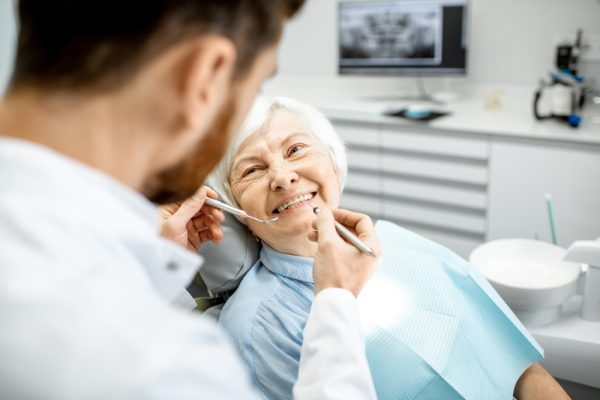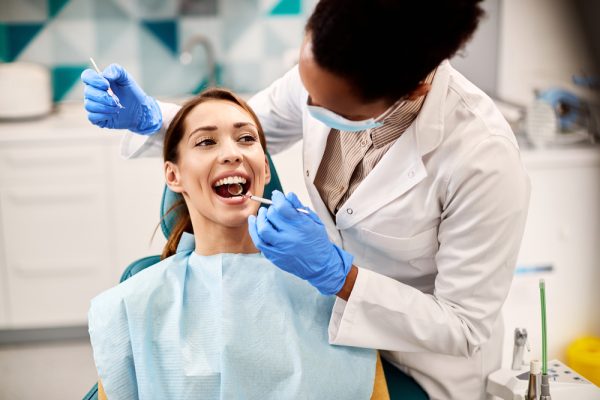Dental Cleanings Aid in the Detection of Oral Cancer
What Is Oral Cancer?
Oral cancer is a serious condition that affects the tissues in the mouth or throat. It can develop in the tongue, lips, gums, roof of the mouth, or other areas of the mouth. While the causes of oral cancers aren’t yet fully understood, it’s known that certain factors can increase the risk of developing the disease, such as tobacco use, excessive alcohol consumption, and exposure to the human papillomavirus (HPV).
Our Seattle dentists break down the importance of yearly oral cancer screenings and how early diagnosis and treatment increase the odds of a successful outcome.

The Importance of Yearly Oral Cancer Screenings
Yearly oral cancer screenings are crucial for early detection and treatment. Like other types of cancer, oral cancer can be more effectively treated when it’s caught early. Unfortunately, oral cancers aren’t often detected until they’ve reached an advanced stage, which can make them more difficult to treat and lower the chances of survival.
The American Cancer Society recommends that individuals receive oral cancer screenings as part of their routine dental checkups, or at least once a year. These screenings can help detect any signs and symptoms of oral cancer early on, increasing the chances of successful cancer treatment.
Oral Cancer Symptoms
If you’ve noticed any of the following common symptoms associated with oral cancers, contact your dentist as soon as possible:
- A mouth sore that doesn’t heal within two weeks
- Red or white patches in the mouth
- Persistent sore throat or hoarseness
- Difficulty chewing or swallowing
- Lump or thickening in the cheek or neck
- Pain in the mouth, jaw, or tongue
- Loose teeth
- Changes in the way teeth fit together
- Numbness in the mouth or face
- Unexplained weight loss
How Dental Cleanings Aid in Detecting Oral Cancers
Regular dental cleanings can play an important role in the detection of oral cancers. During a dental cleaning, your dentist will perform an oral cancer screening. They’ll examine the mouth for any signs of cancer, such as red or white patches, sores, or lumps. They may also ask about any symptoms or changes that the patient has noticed in their mouth, such as mouth pain, difficulty swallowing, or changes in their voice.
In addition to a visual examination, your dentist may also use special dental tools to detect abnormalities in the tissues of the mouth and throat. This can include using a tongue depressor to view the back of the mouth and a dental mirror to check the sides of the tongue.
If any abnormalities are found in the oral cavity, your dentist may perform further testing, such as a biopsy or imaging tests, to determine if cancer is present.

Risk Factors for Oral Cancer
There are various risk factors for oral cancer. The following factors may increase your chances of developing oral cancer:
- Chewing tobacco or other tobacco use
- Heavy alcohol use
- HPV infection
- Age: Oral cancer is more common in people over the age of 45
- Gender: Men are more likely than women to develop oral cancer
- Excessive sun exposure
- Weakened immune system: People with weakened immune systems, such as those with HIV/AIDS or organ transplant recipients, have a higher risk of oral cancer.
- Poor oral hygiene
- Family history
Oral Cancer Prevention
Prevention is key when it comes to oral cancer. A few ways to prevent mouth cancer and reduce your risk of developing it include:
- Quit smoking: Smoking is one of the leading causes of oral cancer. If you smoke, quitting is the single best thing you can do to reduce your risk.
- Limit alcohol consumption: Heavy alcohol use is another major risk factor for oral cancer. If you choose to drink alcohol, do so in moderation.
- Protect your lips from the sun: Sun exposure can increase the risk of lip cancer. Use a lip balm with SPF 30 or higher when you’re outside.
- Practice good oral hygiene: Regular brushing and flossing can help prevent oral cancer by removing bacteria and other harmful substances from the mouth.
- Get regular dental checkups: Regular dental checkups can help detect oral cancer early, when it’s most treatable.
- Eat a healthy diet: A diet rich in fruits and vegetables can help reduce the risk of oral cancer.
- Get the HPV vaccine: The human papillomavirus (HPV) is a known risk factor for oral cancer. Getting the HPV vaccine can help reduce your risk.
Oral Cancer Treatments
Treatment options for oral cancers may vary depending on the stage of the disease and the individual’s overall health. The most common ways to treat oral cancer include:
- Surgery: In some cases, surgery may be necessary to remove the cancerous tissues in the mouth or throat. This may involve removing part or all of the affected tissue, as well as nearby lymph nodes.
- Radiation Therapy: Radiation therapy uses high-energy radiation to kill cancer cells. It may be used alone or in combination with surgery or chemotherapy.
- Targeted therapy: A type of treatment that targets specific molecules or genes that are involved in the growth and spread of cancer cells. It can be used alone or in combination with other treatments.
- Chemotherapy: Chemotherapy involves the use of drugs to kill cancer cells. It may be used alone or in combination with radiation therapy.
- Palliative care: This focuses on relieving symptoms and improving the quality of life for patients with advanced or incurable oral cancer. It may include pain management, emotional support, and other therapies.
Frequently Asked Questions
While there’s no guaranteed way to prevent oral cancer, there are several steps you can take to reduce your risk. This includes avoiding tobacco and excessive alcohol consumption, maintaining good oral hygiene habits, and getting regular oral cancer screenings.
The American Cancer Society recommends that individuals receive an oral cancer screening as part of their routine dental checkup at least once a year. However, your dental professional may recommend more frequent screenings based on your risk factors and medical history.
Oral cancer diagnosis typically involves a physical examination, biopsy, and imaging tests such as X-rays, CT scans, or an MRI.
Schedule Your Visit Today!
If you have concerns about oral cancer or have not received an oral cancer screening as part of your routine dental checkup, we encourage you to schedule an appointment with your local dentist today. Early detection and treatment are key to improving outcomes for individuals with oral cancer. Don’t wait, take action and schedule your screening today.

